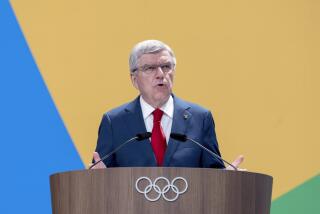IOC to Review Tighter Measures on Eligibility : Olympics: A plan is adopted to help nations pay the way for participants in 1992.
- Share via
TOKYO — The decision-making panel of the International Olympic Committee agreed today to consider measures that could severely tighten eligibility for future Olympic sports and athletes.
The IOC’s Executive Board approved a “general philosophy and principles about how to proceed” with plans to limit the growth of the Games, committee spokeswoman Michele Verdier said.
The board, in the second day of meetings before the IOC session begins Sunday, also adopted a $13.7-million plan to help nations pay to send teams to the 1992 Winter and Summer Games.
It can afford it. The board was told that television rights fees and sponsorships will produce nearly $2 billion for the Olympic movement by the time the ’92 Games are staged.
With increased popularity in the past decade, the Olympics have attracted record numbers of athletes and sports.
In Barcelona in 1992, there will be 237 gold medals awarded in 25 sports, and the IOC this summer imposed a ceiling of 10,000 athletes for those Games.
The Winter Games’ schedule is “well-balanced and stable” and will not be affected by the squeeze, Verdier said.
IOC President Juan Antonio Samaranch has said that the time may be near when some outdated sports are dropped from the Summer Olympics and replaced by more popular ones. Verdier said Thursday’s discussion did not deal with any sports in particular but rather the need to limit the growth rate.
“We have to understand that by adding sports and athletes, we place a tremendous burden on organizing committees,” she said. “We might wind up with no candidate cities to host the Games.”
Six cities are bidding for the 1996 Summer Games. The IOC will decide the winner Tuesday.
Verdier said the IOC’s program commission will conduct a sport-by-sport review and make its first report to the board in December. She said no final action can be expected for at least a year.
Restrictions considered may include tighter qualifying standards, tougher rules for adding sports and eliminating artificial team competition in individual events, she said.
Last month, Vitaly Smirnov, head of the program commission, said he wanted the proposals to contain “serious measures,” including the possibility of forcing sports to give up events if they wanted to add new ones.
The money to help pay for Olympic athletes comes from the IOC’s Solidarity Fund.
It will pay for air fare and board for three athletes and one official from each country at the Winter Olympics, and six athletes and two officials from each country at the Summer Olympics. In addition, each national Olympic committee gets equipment funding ($6,000 for Winter, $8,000 for Summer) and $800 for each athlete.
More to Read
Go beyond the scoreboard
Get the latest on L.A.'s teams in the daily Sports Report newsletter.
You may occasionally receive promotional content from the Los Angeles Times.






